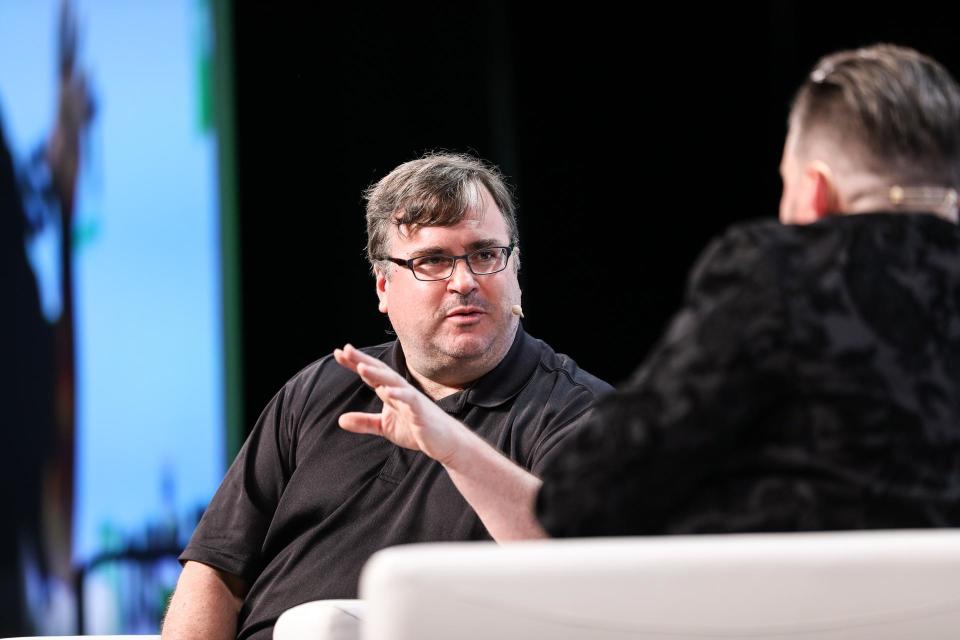LinkedIn co-founder Reid Hoffman defends Facebook’s response to election meddling
Ask LinkedIn co-founder Reid Hoffman about Facebook (FB), in which he was an early investor, and the answer unequivocally remains pro-Facebook. Never mind the controversies that have rocked the social network to its core, including foreign interference around the 2016 U.S. presidential election and the Cambridge Analytica scandal.
“Some people argue, well, it [Facebook] wasn’t quite fast enough,” Hoffman, currently a partner at Greylock Partners, told Yahoo Finance in an interview at TechCrunch Disrupt on Thursday. “Well, you would kind of have to foresee that, wow, foreign governments are kind of manipulating the platform. It might have taken a little longer to see them than you’d ideally want to. Who knows [if they] would have been better at that? But they are taking it very seriously right now.”

Adds Hoffman: “I think it’s reasonable to say that when these people were creating businesses, they didn’t realize that foreign governments were going to use them to try to manipulate U.S. elections and other elections.”
Prioritizing speed over efficiency
Hoffman co-authored the upcoming book, “Blitzscaling: The Lightning-Fast Path to Building Massively Valuable Companies,” which outlines a growth methodology for early-stage startups that prioritizes speed over efficiency. Many of the nine rules for effectively “blitzscaling” sound counterintuitive, including “embrace chaos,” “let fires burn,” even “launch a product that embarrasses you.” The last rule sounds particularly counterintuitive. After all, why release a product you’re not proud of?
“If you launch a product that embarrasses you, that’s emphasizing speed,” Hoffman explains. “Get the minimum viable product out. Start getting data. See if you have product market fit in order to be able to accelerate in speed and be learning about it. So the focus isn’t on, ‘Oh, I failed. I wasn’t embarrassed.’ It’s, ‘I failed. I didn’t move fast enough.’ But moving fast means you’re going to do something small. You’re going to do something that kind of embarrasses you as a way of doing it.”
Facebook is one of several companies Hoffman contends in his book “blitzscaled” into profitable, publicly traded companies, joining other tech giants such as Microsoft (MSFT), Google (GOOG, GOOGL) and Alibaba (BABA). But it’s impossible to overlook the social network’s troubles since the 2016 U.S. presidential election and the Cambridge Analytica scandal, which justifiably raised concerns around Facebook over trust and data privacy.
As the third most-trafficked website in the world, doesn’t Facebook have a responsibility to help preserve the integrity of political elections, not to mention user data?
Facebook COO Sheryl Sandberg’s testimony on Capitol Hill this Wednesday was merely the latest instance of lawmakers taking the social network to task on this front. The Facebook executive’s appearance also arrived amid growing concerns the U.S. isn’t doing enough to shield itself from foreign interference as the congressional midterm elections approach.
Yet Hoffman contends Facebook and CEO Mark Zuckerberg have significantly ramped up efforts to combat foreign interference and the spread of misinformation, which include removing fake accounts and upping transparency around advertising.
“That’s essentially what blitzscaling companies should do,” Hoffman explains. “As they go through each level, they go, ‘Ok, I’m recomputing. Do I have big risks for my customers? Do I have big risks for my society? Is there little stuff I should do now? Is there big stuff I should do now? Is there big stuff I should do later? That’s actually a part of how they create these companies, and you’re seeing that at Facebook.”
‘Blitzscaling’ gone wrong
Another company that made headlines this week, the long-embattled blood testing firm Theranos, announced this week it was finally dissolving. Theranos’s alleged infractions have been covered at length, but chief among them: misrepresenting the abilities of its blood-testing technology, a multimillion-dollar scheme to defraud investors, and exaggerating their revenues by 1,000-fold for 2014.
“Well, it [Theranos] definitely blitzscaled a little too far — not even a little too far,” Hoffman concedes, adding that one of Theranos’s two key issues was rolling out technology that was potentially dangerous.
It’s one thing to roll out an entertainment app that simply doesn’t work, but it’s another to misrepresent blood-testing tools that could endanger the health of its users.
The other key learning area for blitzscaling startups? Don’t misrepresent yourself.
“You might say, ‘Hey, we think that we’re really going to be good, and we’re not there yet, but we’re working on it,” Hoffman adds. “OK, fine. Say, ‘We think we’re going to get there.’ Not, ‘Oh, we are there. The blood test works. We have all this revenue.’ Don’t lie.”
Holmes and Theranos certainly learned that lesson the hard way.
—
JP Mangalindan is the Chief Tech Correspondent for Yahoo Finance covering the intersection of tech and business. Email story tips and musings to jpm@oath.com. Follow him on Twitter or Facebook.
More from JP:
Bitcoin advocate Charlie Shrem: Here’s how long you should hold your crypto
Reddit co-founder: Why I’m betting on bitcoin despite its volatility
Nvidia CEO: ‘Computer graphics will never be the same again’
Amazon self-published authors: Our books were banned for no reason
Pandora CEO: ‘We’re in the early innings of turning things around’

